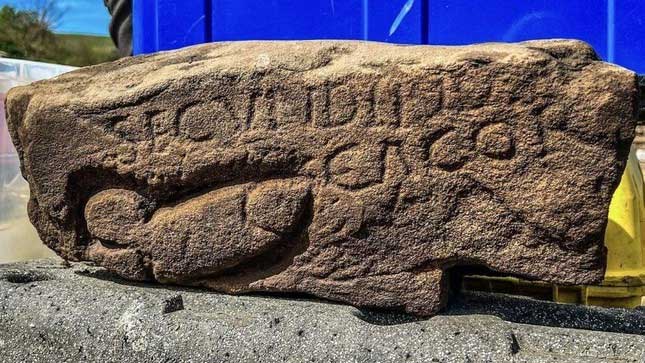Archaeologists in England were recently astonished to discover a carving on a stone at a Roman fort: a crude depiction of male genitalia accompanied by a phrase that experts believe translates to “the bastard”, along with the name of an individual, seemingly etched by a Roman soldier to insult a fellow comrade.
The stone, measuring 40 cm wide and 15 cm high, was uncovered on May 19 at Vindolanda, the remains of a Roman fort located just south of Hadrian’s Wall—a formidable structure that served as the northern boundary of the Roman Empire, designed to protect Britain from the Picts in Caledonia. Archaeologists estimate that this carving was made around the 3rd century AD.

The stone with the carving of male genitalia and the Roman insult from 1,700 years ago.
Archaeologist Dylan Herbert, a retired biochemist from Wales, excavated the stone. “From the back, it looked like all the other stones, a very ordinary stone, but when I turned it over, I was startled to see some clear letters. After removing all the mud, the stone demanded everyone’s attention,” Dylan Herbert stated.
The most striking feature of the stone is the depiction of male genitalia, but researchers are more intrigued by the accompanying inscription. Experts have identified the phrase “SECUNDINUS CACOR” as an abbreviation for “Secundinus cacator”, which translates to “Secundinus” (roughly meaning the bastard).
Andrew Birley, who oversees the excavation and is the executive director of the Vindolanda Charity Trust, commented: “We were truly surprised to decode the message carved on the stone.”
The carving of male genitalia is not uncommon in the Roman Empire, and this newly discovered carving is the 13th such depiction found at Vindolanda.
In June 2021, a carving of a naked cavalryman was also discovered at Vindolanda. The depiction of male genitalia is often carved as a symbol of luck or fertility.
However, the recently discovered carving clearly serves as an insult, which has surprised researchers. The depth of the carving lines on the stone indicates that the individual spent considerable time on this work.


















































